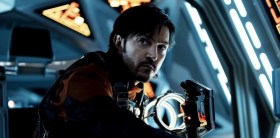Black Mirror is a lot of things: drama, satire, black comedy, thriller. Really, it’s just good television.
Based on dark side of our modern obsession with technology, the show takes voyeurism, escapism, apathy and obsession to their extremes without being unbelievable. These are worlds, creator Charlie Brooker wrote for The Guardian, ‘we might be living in 10 minutes’ time if we’re clumsy.’
People are at the forefront of each episode and their relationships, now affected almost irrevocably by technology, provide the drama. That’s the in: no matter how far-flung the world on display, ours is the first step towards it.
The series consists of two seasons of three stand-alone episodes (only five are featured on SBS’s ‘Complete Collection’ DVD: episode two of season one was held off due to music clearance issues).
Season one opens strong with The National Anthem, a political thriller complete with a kidnapped Royal and an obscene ransom demand, enabled and pushed forward by social media. It skewers a contemporary obsession with commentary (at the expense of watching the real world) and the traditional media inability to keep up.
It’s equal parts dark comedy, satire and drama that moves along briskly. It’s a bit too blunt in its climatic moments (we don’t need to be told the kidnapper was making a point, do we?), but its ending deftly contrasts the public and private results to the episode in a way that’s both triumphant and devastating.
Episode three, The Entire History of You, takes people constantly documenting their lives to its logical end: a device called Grain in available for implant into your head. It documents your every experience, making available for review and sharing. Would you be able to resist the temptation to obsess over every mistake and utterance? Is that empowering or it the fallibility of memory integral to a happy life?
The episode is a series highlight, using occasional moments of humour to strengthen the emotional plight of protagonist Jamie slowly tears himself apart. Robert Downy Jr has optioned the episode so it may become a feature film but it’s difficult to see what could be added without detriment.

Liam, the protagonist of The Entire History of You, replays moments of his life.
Season two sticks to the personal with Be Right Back. What if people who die can kind-of, sort-of live on through virtual avatars? Be Right Back takes current services like Lives On (which offers a ‘social afterlife’ by tweeting as you after you die, based on algorithms and other discomforting things) and superpowers them, enabling an interactive recreation of any of your loved ones, provided they posted enough online.
The episode dives right into the uncanny valley where replication is almost good enough, but its failings, however small, expose the gap between humanity and technology. While the episode lags in places and lacks the emotional impact it should have snappy dialogue and believable characters ensure the episode hits hard.
White Bear is perhaps the darkest episode in the collection. A woman wakes up with no memory of who or where she is. She may have a daughter, somewhere. A strange glyph is on every screen. She may have a daughter. People are trying to kill her while her neighbours record everything.
Its ending is a condemnation of voyeurism and spectacle but the action before it leans too heavily on the amnesia angle. While it’s all in service of the plot, it limits attachment to events. (But that may be a good thing when torture-via-drill is involved.)
The final episode, The Waldo Moment, is the bluntest and suffers for it. A crude cartoon bear named Waldo gains traction with the public for his interviews mocking politicians and is thrust into an upcoming by-election in a small town. Waldo’s voice, Jamie, isn’t too happy about it. It’s an attack on both political disenfranchisement and the system that has inspired it (e.g. career politicians).
The episode started as an idea for Nathan Barley (another of Brooker’s creations) and it shows: The Waldo Moment could happen tomorrow and is more concerned about the destructive cult of personality than the technology that allows it to grow. The final scene is the episode’s most interesting and could have made for a better starting point. However, The Waldo Moment is still entertaining television, if a little off point.
The series is well acted, well shot and well scored. Scenes are allowed to linger just long enough. Music cues hit at just the right moment to destroy you emotionally. Nothing feels wasted or unimportant. Amazing pieces of tech are presented as a fact of life and not something for us to gawk at. Black humour runs throughout the series and it’s used effectively, helping the viewer bond to characters quickly so to devastate them moments later.
A lesser show could get a lot of mileage out of the ideas in Black Mirror but by asking ‘What does it mean to be human in this world?’ it becomes something more.
Rating: 4 out of 5 stars.
Black Mirror
Created by Charlie Brooker
England
Distributor: SBS
Image: Domhnall Gleeson as Ash in ‘Be Right Back’
Actors:
Director:
Format:
Country:
Release:





